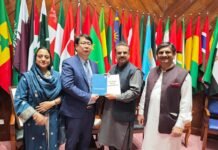New York, 11 August 2022 (TDI): Qatar renewed its calls for a nuclear-free Middle East during the Tenth Review Conference of the Parties to Nuclear Non-Proliferation Treaty (NPT).
Acting Director of the Department of International Organizations at the Ministry of Foreign Affairs of Qatar, Ali Khalfan Al Mansouri, delivered the statement.
He stressed that the establishment of nuclear-free zones is a step in boosting the non-proliferation system and achieving full nuclear disarmament.
He also emphasized that the nuclear-free Middle East is a common goal of the people of the region and the entire international community.
The NPT conference is being held from August 1 to 26. The conference’s focus is regional issues, particularly in the Middle Eastern region. It also focuses on the implementation of the 1995 Middle East Resolution.
Qatar Renews Calls for Nuke-Free Middle East Region
🔗To learn more : https://t.co/uqaRaIoMOT#MOFAQatar pic.twitter.com/MLIxUiyr4i
— Ministry of Foreign Affairs – Qatar (@MofaQatar_EN) August 10, 2022
Nuclear-Weapon-Free Zones
Over the past decades, five nuclear-weapon-free zones have been established globally. The establishment shows the commitment of the signatories to not possess nuclear weapons.
It also shows their will to sign comprehensive safeguards agreements with the International Atomic Energy Agency (IAEA).
Al Mansouri noted that these zones enhanced stability in the regions where they were established and brought the treaty closer to the ultimate goal of a world free of nuclear weapons.
Also read: Jordan urges to work for N-free Middle East
Furthermore, it is a collective responsibility to establish these zones under international resolutions. The outcomes of 1995, 2010, and 2015 review conferences also called for establishing these zones.
Al Mansouri warned that the delay in establishing a nuclear-free zone bears consequences that threaten international and regional peace and security.
Call for Action
He also called on the signatories of the NPT to translate their responsibilities into taking practical steps. He further stressed the need for the United Nations (UN) and the UN Secretary-General in person to play their roles.
These steps would help ensure an early establishment of the zone. He called on the Security Council, by virtue of its responsibilities to maintain international peace and security.
Under Resolutions 487 (1981) and 687 (1991), UN Security Council should contribute to the efforts to establish the zone.
“Establishing the region is a collective responsibility imposed by international documents and resolutions, and the continuation of the current stalemate is a matter that exacerbates the instability in the region and detracts from the credibility of the treaty and the decisions of its review conferences,” Al Mansouri said.
He reiterated that the accession of Israel to the NPT and subjecting its nuclear facilities to the safeguards system paves the way for the establishment of the zone.
It will boost the credibility of the treaty and will bring it closer to universality. Moreover, it will also speed up the implementation of the nuclear disarmament goal.
He was optimistic that the Final Document of the Tenth Conference would include practical steps. The steps would be based on the 1995 Middle East Resolution. It would also include decisions of the 2010 and 2015 Review Conferences.
He also expressed Qatar’s willingness to launch consultations with the rest of the parties to reach the appropriate formulation.
Riffa Ansari is currently working as an Editor and Author at The Diplomatic Insight. She is studying International Relations at Kinnaird College for Women University, Lahore. She is an avid reader aiming to add to her knowledge.








